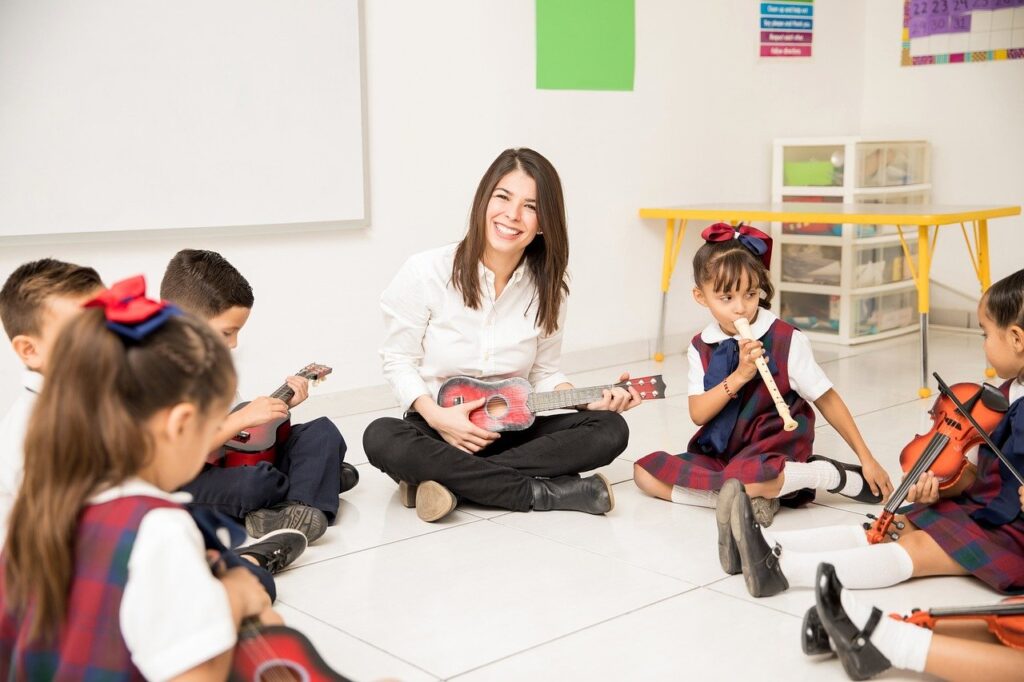Good parents are great teachers. This means that, as a parent, you already have many of the skills and characteristics you need to handle the demands of teaching.
Patience, communication, and compassion are hallmarks of effective parenting and are just as critical in the classroom. Suppose you’ve ever had to teach your child their multiplication tables or given basic biology lessons. In that case, you are already adept at guiding children through challenges while fostering a sense of curiosity and confidence.
In addition, if you incorporate educational play into your child’s daily routine, you already have a pedagogical foundation you can build on when you step into a professional teaching role.
Qualities of Great Teachers

Parental qualities like patience, perseverance, and empathy make the transition into teaching a natural progression. Moreover, parents bring unique perspectives to the classroom. Your firsthand experience of raising children equips you with insights into how kids think, learn, and behave.
This understanding helps create an empathetic and inclusive learning environment where every student feels secure. For instance, parents often have an innate ability to adapt, whether it’s calming a frustrated child or finding creative ways to explain a difficult concept.
You may need to develop your organizational skills if you want to succeed as a teacher. Preparation is key when working with kids, so set aside plenty of time to lesson plan and grade homework. You’ll also need to know your school’s safety and emergency protocols so you react properly when an emergency arises.
As a parent, you already know the value of enthusiasm, too. Enthusiasm is key when teaching — you can’t let your personal life interfere with your excitement when introducing a classroom of kids to a difficult concept like algebra. This ability to temporarily mask your emotions is something you’ve likely mastered when playing with your children after a stressful day at work.
Ultimately, the ability to connect with kids is a cornerstone of successful teaching. As a parent, you already have a head start in this area. Combine natural rapport-building skills with structured preparation, and you’ll be equipped to handle the challenges of teaching while creating an enriching educational experience for your students.
Parenting vs. Teaching: Key Differences to Understand
While parenting and teaching share many similarities, there are distinct differences that aspiring teacher-parents should understand.
One significant contrast is the scope of responsibility. Parenting involves guiding one child or a small, familiar group of children, while teaching requires managing an entire classroom of kids with varying needs, learning styles, and personalities.
Classroom management can feel overwhelming compared to the intimate setting of a home. As a teacher, you’ll need to balance maintaining authority with creating a supportive and inclusive environment. This includes setting clear expectations, addressing behavioral issues constructively, and ensuring every student has the opportunity to thrive.
Another key difference is the structured nature of teaching. In the classroom, you’re responsible for meeting curriculum demands, preparing students for standardized testing, and adhering to educational standards. These external pressures can add a layer of complexity that parents don’t encounter at home.
Understanding how children learn is vital for navigating these challenges. Tailoring curriculum and activities to different learning styles will help students better understand what you’re teaching and how to apply it.
Anticipating some of the challenges that will come with teaching can also be helpful. From managing larger groups to dealing with administrative requirements, the role demands a higher level of organization and resilience.
The skills honed through parenting, like adaptability and problem-solving, are invaluable assets in anticipating and overcoming these challenges.
The Path to Becoming a Teacher

The path to becoming a teacher is relatively simple, but that doesn’t mean it’s easy. It involves several steps, from meeting educational requirements to gaining practical experience.
Most teachers hold a bachelor’s degree in education or a related field, along with state-specific certification. Depending on your background or desired teaching area, you may need to complete additional coursework or training programs, such as student teaching practice or specialized training in areas like special education, ESL, or early childhood education.
Balancing these requirements with family life can be challenging, but it’s manageable with a little creativity and willingness. Online programs, part-time classes, and support from family and friends can help you navigate this transition smoothly.
Hands-on experience (beyond parenting) is also crucial for developing your teaching skills. Volunteer opportunities, substitute teaching, and part-time roles are excellent ways to get started. These experiences can build your confidence and introduce you to pedagogical approaches that will serve you well for years to come.
Assessing whether you have what it takes to be a good teacher is another important step. Ask yourself questions like:
- Do I have strong communication skills, empathy, and a passion for helping others?
- Am I even-tempered?
- Can I be an effective motivator?
- Am I organized and can I be flexible when the situation demands it?
If your answer is yes to most of your questions, teaching is likely a good fit for you. You don’t have to be perfect, either — teaching is all about learning from experience and will take years to master.
Embracing a Rewarding Journey
Transitioning from parenting to teaching is a natural extension of your love for helping children grow and succeed. By leveraging your parenting skills, embracing new learning opportunities, and staying resilient, you can make a meaningful impact in the classroom.
It’s also important to recognize that teaching is not just a career, it’s a calling that allows you to shape young minds. You’ll inspire the next generation and teach them all the skills they need to succeed in life, like how to count, write well, communicate effectively, build relationships, and excel in spite of challenges.
















